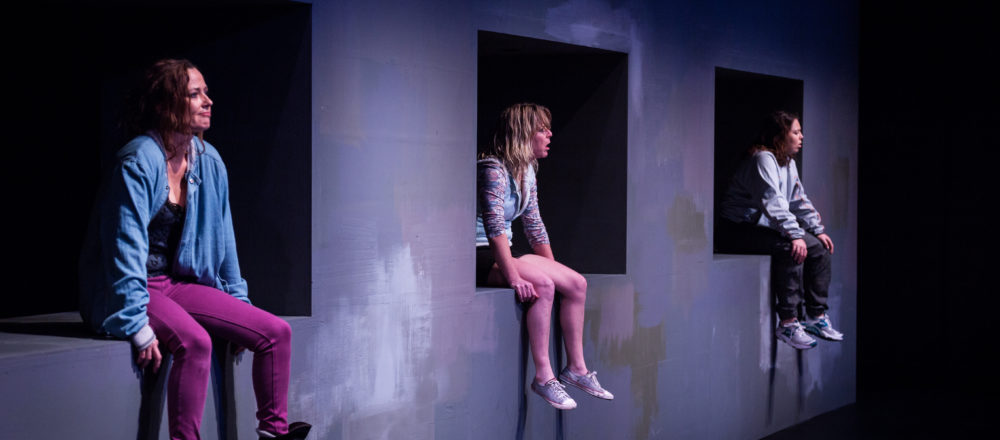SHIT | Melbourne Theatre Company
“Shit” is the term used to describe a certain species of women that have rarely been seen on our theatre stages, until now. Billy, Bobby and Sam are women who are “wild, out of control, and couldn’t-give-a-shit kind of women”, as their producers Susie Dee and Patricia Cornelius describe. They “transgress the boundaries” of gender roles, and shatter our notions of what it means to be female. They are the type of women one avoids making eye contact with on the tram; terrifying but electrifying and essentially “everything girls shouldn’t be, and we hate them”.
Director Dee and writer Cornelius have collaborated for about 30 years and share a visceral and physical approach to theatre. SHIT, with its cautionary disclaimer of “powerfully offensive language”, is as in-your-face as its title suggests.
“What is profound about Dee and Cornlieus’s work is that it explores the devastating and self-destructive ways in which battered women can internalise misogyny.”
Opening with a confronting, yet comical discussion of the dominant role of the “F” word in these women’s vocabulary, the play eventually moves past its unsettling exposition to weave a powerful, and at times heart-wrenching account of these women’s upbringing, and just how they came to be “shit”.
The play analyses what Dee describes as the “powerlessness of women who are on the periphery”, particularly within violent women in prisons or gangs who are increasingly being exposed within our society. The three female characters of SHIT have had a tumultuous upbringing in institutional care and have been subjected to physical, psychological and sexual abuse from such a young age that you “just don’t ask”, as Billy, played by Nicci Wilks, solemnly makes clear.
The audience is taken on a rollercoaster of conflicting emotions harboured towards these women. While volatile, unlikeable and capable of unspeakable acts, they have also had the chance to live a full and fruitful life stolen from them, and have ‘”good reason” to be the way they are.
At its core, SHIT speaks to the plight of women subjected to domestic violence. What is profound about Dee and Cornlieus’s work is that it explores the devastating and self-destructive ways in which battered women can internalise misogyny. For Sam, played by Peta Brady, empowerment was sought through sneaking out of her home at the tender age of 15 and having sex with strangers. Bobby, played by Sarah Ward, responds to her mistreatment by donning misogyny as her armour. Her female physicality is something that repulses her, for it associates her with “them”; the women who can’t fight back, or save themselves, and sometimes provoke their own abuse from partners for “never learning to shut up”.
The attitudes of the women in SHIT resonate with what former Chief Police Commissioner Kenneth “Ken” Lay continues to remind the public, that “we are constantly misapprehending the nature of violence” against women. To feel safer, Lay explains, we apportion complicity to those who die violently, rendering them somehow responsible for the wickedness that befell them.
For Cornelius, writing about “the world we pretend doesn’t exist, or feel shouldn’t be the subject of our literature” is a passion. These women are difficult and problematic characters, often “inarticulate, angry and full of contradiction”. However, it is a feminist act in itself to engage with them, because women like them often slip between the cracks of mainstream society’s reductive and narrow portrayals of what being a woman entails.
As Cornelius argues, there are far too few flawed, dangerous and powerful great female characters on the stage, such as the “Medeas, Elektras, Lady Macbeths and Heddas”. They may be bleak, but they are important. “We’ve confused theatre with entertainment”, Cornelius argues, disagreeing with the idea that theatre should offer a means of escaping reality. These women have the “right to be heard”, and have us confronting and challenging our own prejudices about aggressive women who have been oppressed.
Image credit Sebastian Bourges
Image caption Peta Brady, Nicci Wilks and Sarah Ward
SHIT is showing as part of the Neon Festival at the Melbourne Theatre Company until 5 July 2015.


